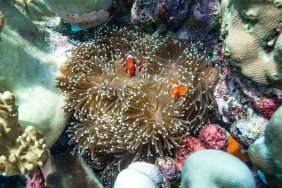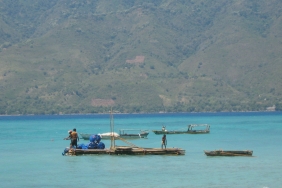MANGROVE CRAB FISHERMEN LEARN ECO-FRIENDLY FISHING PRACTICES
Author: Windy Rizki A.P (Capture Fisheries Officer, WWF-Indonesia)
The large amount of mangrove land still available and the use of environmentally friendly fishing gear to catch mangrove crabs make this commodity with the local name ketang bakau a leading product in the Bunaken National Park area, North Sulawesi. To support the effort to make mangrove crab fishing more environmentally friendly and increase the selling value with proper post-capture handling, last May on May 12, 2016 in Mantehage Island and a day later, on May 13, 2016 in Popareng Village, Mangrove Crab BMP training was conducted. Mantehage Island and Popareng Village are two locations assisted by WWF-Indonesia in South Minahasa.
BMP or Better Management Practices is a series of fishing and handling guidelines for various commodities, both capture fisheries and aquaculture, published by WWF-Indonesia and has gone through a long process involving practitioners and academics. This training activity involving fishermen around the Bunaken National Park area is one of the stages in the mangrove crab fisheries improvement program facilitated by the Forum Masyarakat Peduli Taman Nasional Bunaken/FMPTNB with support from WWF-Indonesia.
The mangrove crab BMP training program began with pretest to measure the fishermen's understanding of sustainable mangrove crab management. After that, the activity continued with the delivery of material from WWF-Indonesia representatives and ended with postttest to determine how far the absorption of material that can be received by fishermen. What is interesting about the BMP training this time, although during the activity there was no electricity in both Mantehage Island and Popareng Village, it did not become an obstacle. The fishermen were still eager to participate in the training even though they only saw the material from the laptops and BMP books that were distributed.
From the pretest and posttest conducted, there was an increase in the score of Popareng Village by 0.22%. This figure is not high enough when compared to the score increase in previous BMP trainings conducted elsewhere. However, at least there is an increase in the knowledge of the fishermen regarding environmentally friendly mangrove crab fishing practices, although it is not too big. Meanwhile, the pretest and posttest scores in Mantehage Island actually decreased by 0.46%. Investigated, this decline was due to the fact that many fishermen did not take the posttest because they had to go home first. In addition, the number of fishermen on Mantehage Island who cannot read and write is also a factor. This is also a lesson learned and a note for the next BMP training.
Mr. Joko as a representative of the North Sulawesi Marine and Fisheries Service (DKP) was also present at this activity. He said that DKP is very supportive of group assistance and this kind of training to increase the capacity of fishermen in Manado. It is hoped that in the future fishermen can have more insight into environmentally friendly fishing practices, especially regarding the capture of egg-laying crabs which is still rampant. In the future plan, DKP of South Minahasa District will also be present in the endorsement of the fishermen group in Popareng with the aim that the group can be stronger organizationally and can implement the environmentally friendly values of this BMP well.





